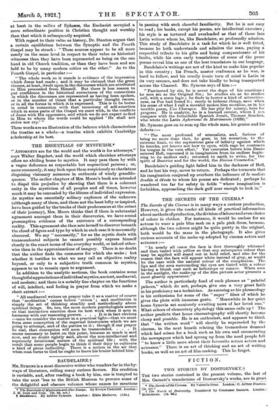BAUDELAIRE. t
Mn. SYMONS is a most discursive writer who wanders far in the by- ways of literature, culling many curious flowers. His erudition is enviable, and, after reading a book by him, one is tempted to take the next 'bus to the British Museum to procure some of the delightful and obscure volumes whose names he mentions • The Essentials of Mysticism and other Essays. By Evelyn Underhill. London : J. Di. Dent and Sons. [Ss. ed. net.] t Baudelasre. By Arthur Symons. London : Elkin Mathews. t1654 in passing with such cheerful familiarity. But he is not easy to read ; his books, except his poems, are intellectual exercises ; his style is as tortured and overloaded as that of those late
Latin writers whom he, like Baudelaire, so profoundly admires. This study of Baudelaire is a task for which he is well fitted, because he both understands and admires the man, paying a respectful tribute to his gifts and being compassionate of his faults, while his own early translations of some of the prose poems reveal him as one of the best translators in our language, Baudelaire's writings are not of the kind to make him popular in this country ; his French, master craftsman as he was, is hard to follow, and his cruelly ironic turn of mind is Latin in its very essence, and does not take kindly to being transported across the Channel. Mr. Symons says of him :-
"Fascinated by sin, he is never the dupe of his emotions ; he sees sin as the Original Sin ; he studies sin as he studies evil, with a stern logic ; he finds in horror a kind of attractive- ness, as Poe had found it ; rarely in hideous things, save when his sense of what I call a moralist makes him moralize, as in his terrible poem, Une Chorogne. He has pity for misery, hate for progress. He is analytic, he is a learned casuist, whom I ce.n compare with the formidable Spanish Jesuit, Thomas Sanchez, who wrote the Latin Aphorismi de Illatrimonio (1629)."
Mr. Symons goes on to sum up the whole man, his genius and his defects :—
" The most profound of sensualists, and, furious of being no more than that, he goes, in his sensation, to the extreme limit, to the mysterious gate of infinity against which he knocks, yet knows not how to open, with rage he contracts his tongue in the vain effort.' Yet centuries before him Dante entered Hell, traversed it in imagination from its endless begin- ning to its endless end ; returned to earth to write, for the spirit of Beatrice and for the world, the Divina Commcdia."
Baudelaire's guiding light failed him in the darkness of Hell, and he lost his way, never to return. Perhaps the torments that
his imagination conjured up overbore the influence of is modiste erudite et devote to whom his poems are dedicated ; perhaps he wandered too far for safety in fields " where imagination is forbidden, approaching the dark gulf near enough to look in."


































 Previous page
Previous page